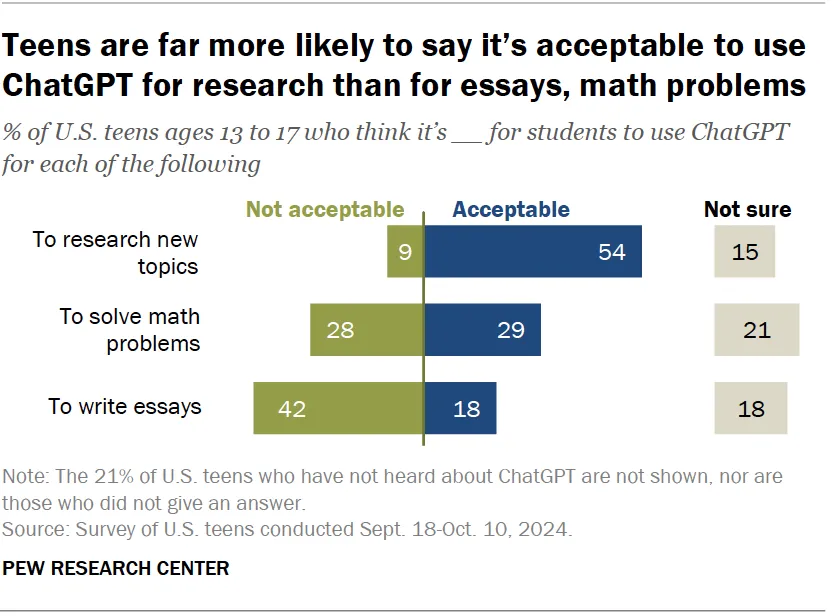OpenAI’s popular chatbot ChatGPT is frequently used amongst all age groups. But we have to admit that the younger Gen Z cannot seem to have enough.
Students routinely use it for schoolwork, a new study by the Pew Research Center shared. However, it’s still not clear if they are aware of the dangers and drawbacks including the high frequency of errors that come with it.
Nearly 1,400 American students between the 13 to 17 year age bracket were enrolled in the latest survey. This was done to determine if ChatGPT was used for homework or any other class assignment. The results shared that 26% agreed on the use of ChatGPT which is nearly double the figure we saw two years back. Moreover, over 50% agreed that it was an acceptable tool to use when exploring new subjects.
29% shared how the tool helped them greatly in math-related sums while 18% felt it was acceptable for use during essay writing. Now this is certainly alarming as many are aware of the shortfalls that this tool comes with. Did we mention the high frequency of errors or inaccuracies?
The tool is not amazing at math for sure and it’s definitely not reliable for getting factual data. Another study shared insights on how you shouldn’t be relying on the AI chatbot because it could only produce replies to a doctorate-level history test more correctly than someone who was randomly guessing.
That same research also shared how it had plenty of weak areas such as geopolitics and social mobility. Interestingly, teenagers who were black and Hispanic were more likely to say it should be used for school work and therefore reported using it more often than white teenagers.
Another interesting study from the University of Pennsylvania shed light on how researchers found high schoolers from Turkey who used ChatGPT performed worse in math than those who had zero access to it. Another study shed light on how researchers saw Germans using the tool could find results for their research quickly and simply. However, they couldn’t piece all the information together as skillfully as their peers who didn’t use ChatGPT.
In 2024, the Pew Research Center shared that a quarter of K-12 teachers thought ChatGPT and similar tools were doing more harm to students than good.
Read next:
• AI Chatbots Provide Non-Judgmental Mental Health Support but Struggle with Memory and Complex Issues
• Starlink Just Dropped an Unbelievable Deal That Could Change Everything, Find Out How!
Students routinely use it for schoolwork, a new study by the Pew Research Center shared. However, it’s still not clear if they are aware of the dangers and drawbacks including the high frequency of errors that come with it.
Nearly 1,400 American students between the 13 to 17 year age bracket were enrolled in the latest survey. This was done to determine if ChatGPT was used for homework or any other class assignment. The results shared that 26% agreed on the use of ChatGPT which is nearly double the figure we saw two years back. Moreover, over 50% agreed that it was an acceptable tool to use when exploring new subjects.
29% shared how the tool helped them greatly in math-related sums while 18% felt it was acceptable for use during essay writing. Now this is certainly alarming as many are aware of the shortfalls that this tool comes with. Did we mention the high frequency of errors or inaccuracies?
The tool is not amazing at math for sure and it’s definitely not reliable for getting factual data. Another study shared insights on how you shouldn’t be relying on the AI chatbot because it could only produce replies to a doctorate-level history test more correctly than someone who was randomly guessing.
That same research also shared how it had plenty of weak areas such as geopolitics and social mobility. Interestingly, teenagers who were black and Hispanic were more likely to say it should be used for school work and therefore reported using it more often than white teenagers.
Another interesting study from the University of Pennsylvania shed light on how researchers found high schoolers from Turkey who used ChatGPT performed worse in math than those who had zero access to it. Another study shed light on how researchers saw Germans using the tool could find results for their research quickly and simply. However, they couldn’t piece all the information together as skillfully as their peers who didn’t use ChatGPT.
In 2024, the Pew Research Center shared that a quarter of K-12 teachers thought ChatGPT and similar tools were doing more harm to students than good.
Read next:
• AI Chatbots Provide Non-Judgmental Mental Health Support but Struggle with Memory and Complex Issues
• Starlink Just Dropped an Unbelievable Deal That Could Change Everything, Find Out How!



